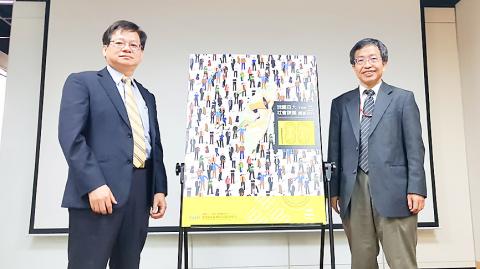Environmental issues, labor rights and salaries were listed as the public issues that receive the most attention, while people in different regions pay closer attention to different issues, a National Applied Research Laboratories survey released yesterday found.
The survey was the first conducted by the laboratories on the social issues about which Taiwanese are most concerned, Science and Technology Policy Research and Information Center associate researcher Lin Pin-hua (林品華) told a news conference in Taipei.
Environmental affairs were listed as the top concern by 15 percent of respondents, followed by labor rights and wages (12 percent), food safety (11 percent), public disasters (10 percent) and energy (10 percent), she said.

Photo: Chien Hui-ju, Taipei Times
People are concerned about environmental issues, such as reducing trash production and recycling, and they hope to promote policies to help middle-aged and older people return to workplace, the survey found.
They also pay attention to food security issues, such as fake or misleading labeling of food products, the effects of extreme weather on sectors such as agriculture, electricity demand, and nuclear power use and safety, it showed.
Respondents’ concerns varied across regions, as people in northern Taiwan said that they pay more attention to the reliability, self-discipline and responsibility of Internet media, as well as national identity and the nation’s name, center director-general Joung Yuh-jzer (莊裕澤) said.
People in central Taiwan focus on weather changes, water supply and quality, the concentrations of air pollutants such as PM2.5 and chlorofluorocarbon emissions, and their effects on human health and the environment, Lin said.
People in southern Taiwan expressed worry about poor water quality and flooding, Lin said, adding that they also pay attention to reducing greenhouse gas emissions to mitigate global warming.
While social issues relevant at the time of data collection could have affected respondents’ choices, the results nonetheless deserve further study, Joung said.
The poll of people older than 20 was conducted from Oct. 25 to Nov. 19 last year, and received 20,048 valid samples. Each respondent was allowed to cast 15 votes for the issues in which they were the most interested.
In terms of geographic location, 45.5 percent were from northern Taiwan, 22.1 percent from central Taiwan, 27 percent from southern Taiwan, 4.3 percent from eastern Taiwan and 1.1 percent from outlying islands.

The High Prosecutors’ Office yesterday withdrew an appeal against the acquittal of a former bank manager 22 years after his death, marking Taiwan’s first instance of prosecutors rendering posthumous justice to a wrongfully convicted defendant. Chu Ching-en (諸慶恩) — formerly a manager at the Taipei branch of BNP Paribas — was in 1999 accused by Weng Mao-chung (翁茂鍾), then-president of Chia Her Industrial Co, of forging a request for a fixed deposit of US$10 million by I-Hwa Industrial Co, a subsidiary of Chia Her, which was used as collateral. Chu was ruled not guilty in the first trial, but was found guilty

DEADLOCK: As the commission is unable to forum a quorum to review license renewal applications, the channel operators are not at fault and can air past their license date The National Communications Commission (NCC) yesterday said that the Public Television Service (PTS) and 36 other television and radio broadcasters could continue airing, despite the commission’s inability to meet a quorum to review their license renewal applications. The licenses of PTS and the other channels are set to expire between this month and June. The National Communications Commission Organization Act (國家通訊傳播委員會組織法) stipulates that the commission must meet the mandated quorum of four to hold a valid meeting. The seven-member commission currently has only three commissioners. “We have informed the channel operators of the progress we have made in reviewing their license renewal applications, and

Taiwan People’s Party (TPP) Chairman Huang Kuo-chang (黃國昌) yesterday appealed to the authorities to release former Taipei mayor Ko Wen-je (柯文哲) from pretrial detention amid conflicting reports about his health. The TPP at a news conference on Thursday said that Ko should be released to a hospital for treatment, adding that he has blood in his urine and had spells of pain and nausea followed by vomiting over the past three months. Hsieh Yen-yau (謝炎堯), a retired professor of internal medicine and Ko’s former teacher, said that Ko’s symptoms aligned with gallstones, kidney inflammation and potentially dangerous heart conditions. Ko, charged with

‘DENIAL DEFENSE’: The US would increase its military presence with uncrewed ships, and submarines, while boosting defense in the Indo-Pacific, a Pete Hegseth memo said The US is reorienting its military strategy to focus primarily on deterring a potential Chinese invasion of Taiwan, a memo signed by US Secretary of Defense Pete Hegseth showed. The memo also called on Taiwan to increase its defense spending. The document, known as the “Interim National Defense Strategic Guidance,” was distributed this month and detailed the national defense plans of US President Donald Trump’s administration, an article in the Washington Post said on Saturday. It outlines how the US can prepare for a potential war with China and defend itself from threats in the “near abroad,” including Greenland and the Panama